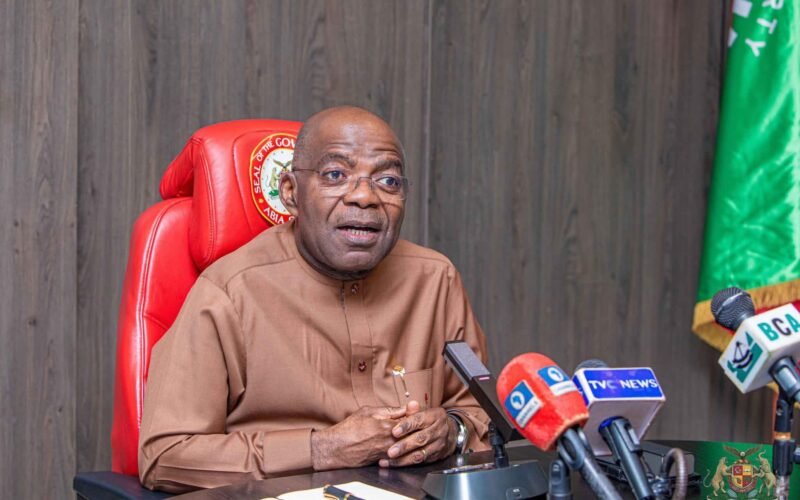When Governance Must Meet Facts: Re-examining the Allegations Against Abia Revenue System
In a recent opinion piece titled “ALEX OTTI ADMINISTRATION AND THE ROT IN ABIA REVENUE SYSTEM: WHEN GOVERNANCE BECOMES A TOOL FOR VENDETTA”, Writer Obinna Eze Oriaku accuses the Abia State Board of Internal Revenue of political victimisation and unprofessional conduct. Yet a careful review of the public record and recent reforms casts serious doubt on the assertions — and invites a more nuanced evaluation.
Leadership Appointments and Reform Context
The piece alleges hostility from the revenue board towards non-aligned taxpayers. Yet publicly available records show that in September 2023, Governor Alex Otti re-appointed Professor Udochukwu Ogbonna as Chairman of the Abia State Board of Internal Revenue — a credible figure whose earlier tenure was credited with a major jump in IGR under the previous administration. The publication Vanguard reported: “Governor Alex Otti has appointed Professor Udochukwu Ogbonna as the Chairman… Prof. Ogbonna had headed the BIR under the administration of former Governor Theodore Orji, and while he held sway, Abia IGR for the first time witnessed a leap.”
This suggests that the administration values continuity of expertise in its revenue institution — a departure from the notion of purely punitive or politically-driven appointments.
Revenue Targets and Transparency
The allegation of institutional collapse conflicts with published data showing that the Abia State Internal Revenue Service (ABIRS) has adopted automation, enumeration, and reform-oriented targets. A May 7 2025 report declared a ₦120 billion IGR target for 2025, alongside a “statewide data enumeration and automation drive” described by Chairman Ogbonna as pivotal for governance and security.
If the process were purely vindictive, such large-scale public reform would invite scrutiny and resistance rather than broad ambition. Instead, the drive signals institutional strengthening — not fragmentation.
Procedural Concerns vs Evidence of Arbitrary Action
The writer claims that his personal tax clearance process was manipulated (assessment raised from ₦70 000 to ₦117 000, then ₦483 000). However, no independent audit, public disclosure or legal judgement is cited to validate these extraordinary figures. In contrast, the revenue board’s official PDF states its mission is “to optimise revenue generation through efficient collection”, and the ABIRS document confirms leadership appointments and transparency initiatives.

Without supporting documentation—for example, published circulars, assessment schedules or legal rulings—allegations remain anecdotal. Meanwhile the public data shows reform orientation.
Institutional Reform or Political Vendetta?
Oriaku’s piece frames the revenue board as a “cesspool of political witch‐hunting” directed by the government. Yet the reform narrative from the government side is very different: automation of tax systems, public enumeration of tax base, and increased institutional capacity. The Guardian in September 2024 quoted Ogbonna saying: “The more infrastructure the country develops, the more revenue it can generate — we’re building infrastructure so we can build our revenue.”
If the board were weaponised, these strategic reforms would hardly appear front-page. Their presence suggests pipeline for growth rather than vendetta.
The Burden of Proof and the Public Trust
In governance, allegations of abuse demand documented proof: published assessments, internal memoranda, audits, or tribunal findings. The broad narrative of victimisation lacks these public artifacts. On the contrary, the administration’s published performance reports, enumeration programmes and IGR targets provide a paper-trail of institutional reform.
If a citizen believes they were wrongfully targeted — by all means they must seek redress. But the state also retains the right to reform institutions and collect revenue competently. To conflate reform with persecution is to undervalue the imperatives of public-sector governance.
Conclusion: Context Matters, Evidence Matters More
The claims made by Alexander Oriaku raise important questions about fairness and professionalism. Yet they stand in tension with publicly-available evidence of systemic reform, leadership stability and online transparency in Abia’s revenue apparatus. Until the case is proved with documentation, the narrative of “vengeance governance” remains speculative.
Abia’s civil service and revenue institutions under Governor Otti are not beyond scrutiny. They are subject to it—and that is the higher form of accountability. The state is publishing its budgets, setting IGR targets, automating tax systems and keeping the public informed. That is not a vendetta—it is governance in motion.
In the end, the yardstick remains: proof over polemic. If you allege institutional abuse, supply the documents. Until then, reform needs to be acknowledged, not presumed illegal.
AProf Chukwuemeka Ifegwu Eke







